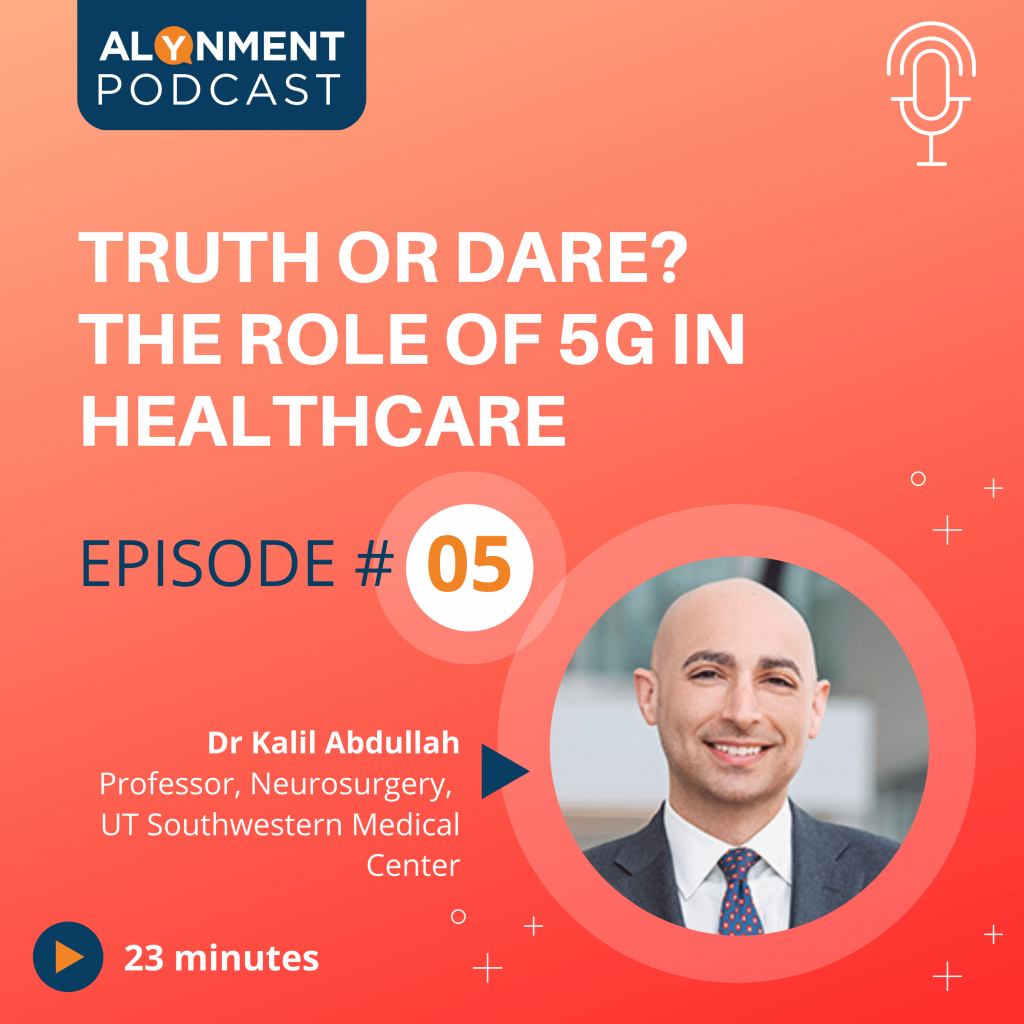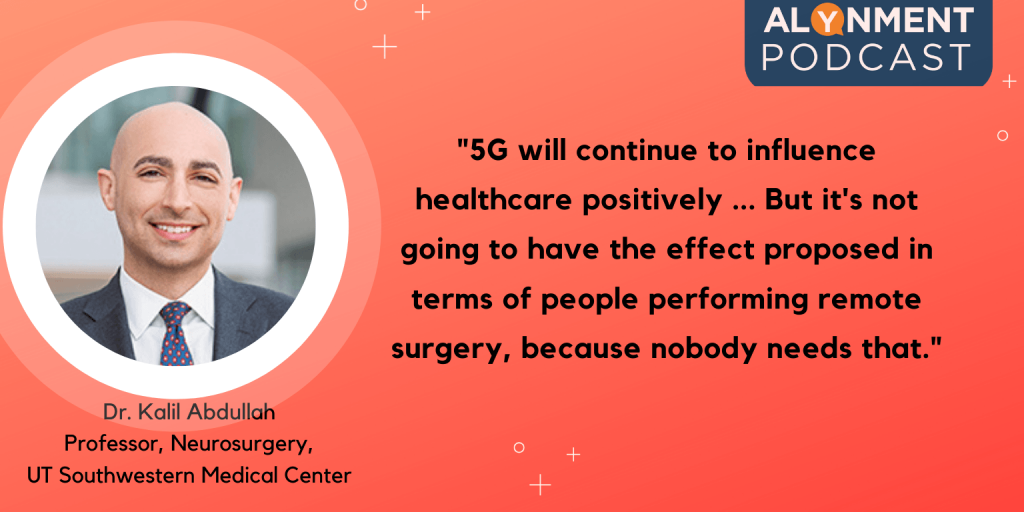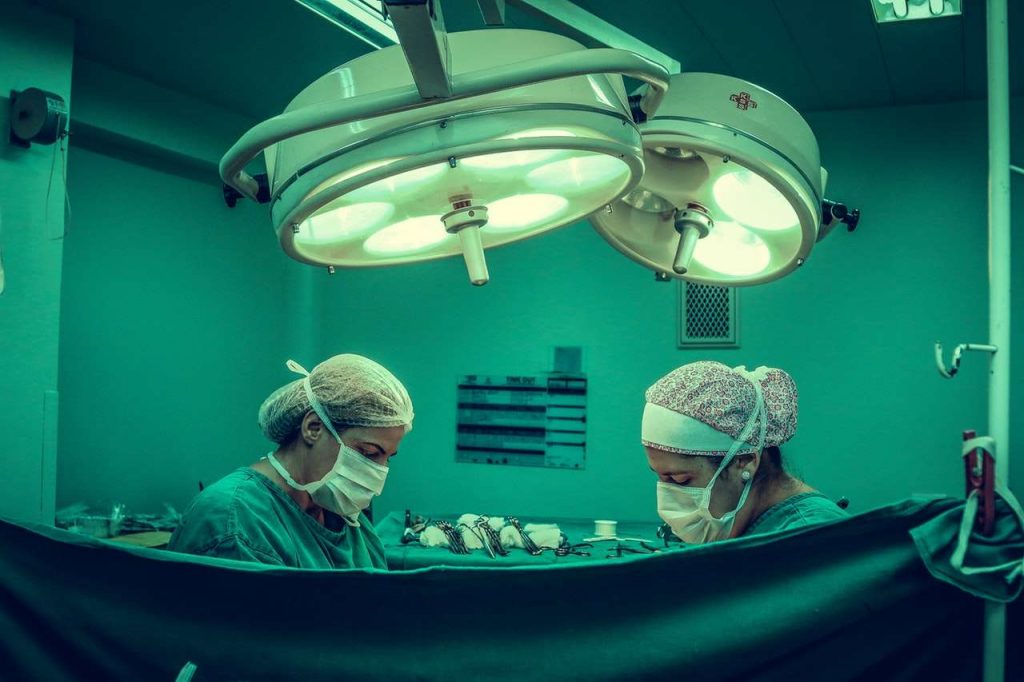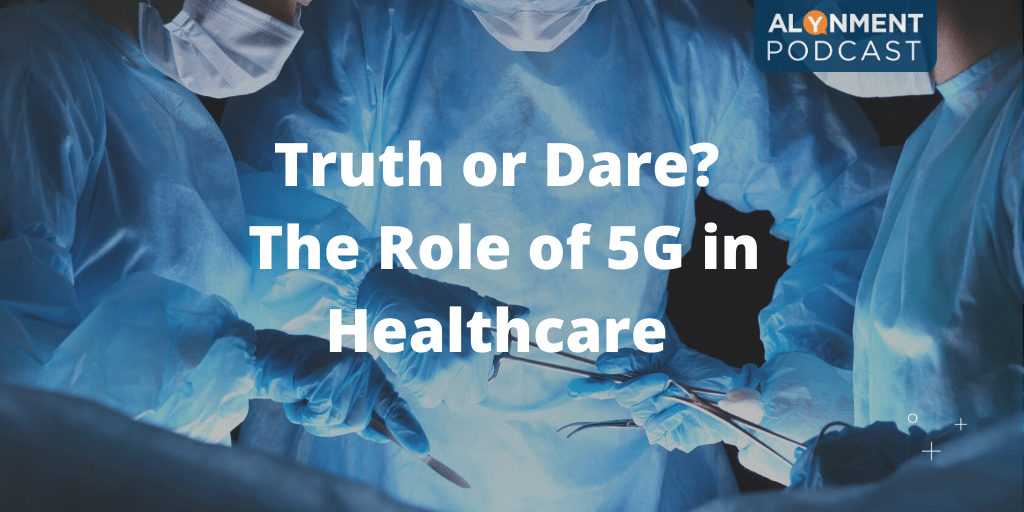5G technology might not be the first thing that comes to mind when you hear the words “brain surgery”. Going under the knife for any reason isn’t the most thrilling proposition for anyone. But how would you feel about getting surgery without doctors in the operating room? 5G promises to bring many innovations to healthcare, including “remote surgery”. But is it fact or fiction? Let’s find out.

Brain surgeon Dr. Kalil Abdullah is an assistant professor in the department of neurosurgery at the University of Texas Southwestern Medical Center and the director of the Integrated Brain Tumor Research program. He has published more than 100 research papers and is regularly invited to speak both nationally and internationally. Today, we’re fortunate to be speaking with him on the Alynment Podcast.
WHY IS HEALTHCARE INDUSTRY THE LAST TO ADOPT NEW TECHNOLOGY?
The reason that the medical field is the slowest to adopt technology is because we are also the ones that are most reliant on it. For the day-to-day aspects of taking care of patients in the hospital, you would want the most reliable technology possible, and a lot of times we wait until a technology has been adopted by consumers or by other industries with success before we embark on doing it ourselves.
WHAT IS THE ROLE OF 5G & AUGMENTED REALITY IN HEALTHCARE?
It’s just like any other technology that claims to revolutionize an industry. 5G is going to influence health care positively, in much the same ways 4G or 3G did and the same way that high-speed Internet via wireless did. But it’s not going to have the effect proposed in terms of people performing remote surgery, because nobody needs that. It’s not a requirement that a patient is operated on by a robot nor is it feasible or practical in any capacity. So the applications of 5G are much more mundane, but much more useful than is being advertised.
WHY IS THERE NO NEED OF 5G FOR REMOTE SURGERY?
Technology has already to some extent revolutionized the operating room. But I do not need augmented reality via 5G right now or in the next five years. What I do need is to be able to talk to my patients via TeleMedicine and Video Conference, regardless of what part of Texas or the rest of the country or world that they’re in. I need to be able to do that reliably. And you would think with our level of technological advance, that would not be an issue. But it is. For example, if I would like to see a patient before or after I performed surgery on them in the traditional manner, I need to establish a TeleMedicine link with them via our software. However, they need to have a certain set of technical requirements that they must meet at their location for our software to be compatible. They must have a connection that is high speed enough and reliable enough that I can reasonably see them via video. Even when all of those things combine, I am often asking them to repeat themselves, and they certainly are asking me to repeat myself just to get the basic components of a medical examination or discussion with video performed. That is an issue that is potentially very well solved by having a reliable and widespread 5G network.

WHAT DO YOU THINK IS THE REAL ISSUE WITH 5G ADOPTED IN A REMOTE SURGERY?
It’s not quite there yet because there are questions like who’s going to perform the remote surgery? Is it a robot? How much does the robot cost? Who calibrates the robot? Is it a person that you’re talking through the surgery? Is that person qualified to do the surgery? Who’s gonna take care of that patient in the intervening hours afterwards? If there is no specialized care team who’s going to perform the next surgery? If there’s a complication on that same patient, then what? These are all considerations that technology does not resolve. In an ideal Hollywood setting, there’s someone who needs emergency brain surgery in the reaches of Alaska, but the reality is, that’s not very common, and that’s not the problem that we’re facing. The problem that we’re facing is access to a centralized expert, someone who is a surgeon or an advanced medical doctor who can provide it to an area where that’s not available. It’s not the technical aspects of performing the surgery that are the issue, it’s the possibility and the communication required to take care of that person over more than just that event.
CAN SOMETHING LIKE TELE-ASSISTANCE HELP SOMEONE WHO IS OPERATING OR TREATING SOMEONE REMOTELY BUT NEEDS EXPERT ADVICE?
Absolutely. That is helpful communication, but that is not augmented reality. That is not even telesurgery, that is simply TeleMedicine. And we need more of that and we also need it to be more reliable.
HAVE 4G AND 3G CHANGED THE WAY YOU PRACTICE MEDICINE?
It has significantly. If I am walking between buildings or I’m not in the hospital, I can pull up my phone and pull the mobile EMR on my 4G LTE phone and I can review a CAT scan urgently. That is not something to be taken lightly as somebody who has seen what cellophane CAT scans look like and used them before. This is an entirely different era of medicine that we’ve entered into. So, I could get a reliable signal on my phone and review an emergency scan or someone in the hospital can send me a CAT scan while I am away and show me what’s happening. Again on an LTE network. This was not possible five years ago.
WHAT ROLE CAN 5G TECHNOLOGY PLAY ON THE PROCESS OF TRIALS DONE BEFORE YOU GET READY FOR A SURGERY?
Cranial surgery (cutting the bone before accessing the brain for surgery) is very complex in a lot of ways and it’s sometimes nice to be able to review the trajectory that you’re taking through certain areas of the brain or the other critical structures that are nearby and how you would perform that surgery before you actually perform it. I think all surgeons do that intuitively, as a matter of their training and in their practice. But technologically, it’s nice to be able to go through that as well. There are a few technologies that are used to help patients see the surgery they’re undergoing and some surgeons are very bullish on surgical theater technology where they’re able to have a 3D reconstruction and an augmented or virtual reality preparation and those are all technologies that are being utilized increasingly. It just depends on the interests of the surgeon and their subspecialty as to whether or not it’s a benefit.

CAN YOU GIVE ANY REAL-WORLD EXAMPLES TO ILLUSTRATE HOW TECHNOLOGY IS HANDY FOR YOU FROM A WIRELESS PERSPECTIVE?
In terms of the actual surgery or in terms of total care, I see patients from all over the state of Texas and Oklahoma and everywhere else to come in for an opinion. And it’s not easy to travel to the hospital when it’s six hours away by car. When you’re able to take care of somebody in the hospital for maybe a few days and provide them advanced surgical care, then they’re able to go home and be with their family, and you’re able to take care of them remotely, it really does have a significant impact on their well-being and quality of life. It’s hard for me to have a brain tumor patient travel from six hours away just for a follow up in two weeks. If I can reliably visit with them technologically, that is a big advance in the way that we practice medicine. It’s better for them, for the community, for the health system and pretty much everyone.
WHAT IS YOUR WISHLIST OF TECHNOLOGY THAT YOU WOULD WANT TO REALLY SOLVE PROBLEMS FOR YOU?
My wish list is very practical and boring. It has less to do with technology than regulation, practicality and health systems. But I really wish there was an application that allowed me to video conference with my patients, to have a stable, reliable 5G video connection. Other physicians could have it in their hospitals so that if they wanted to show me a patient, they could walk up to the patient and turn their phone camera on, and we could discuss the patient with clarity and efficiency. It would be really great if there was a universally compliant application on your phone that would allow people to communicate directly.
WHAT ADVICE WOULD YOU GIVE TO THE TECHNOLOGISTS OUT THERE WHO ARE ACTIVELY PROMOTING BIG PROMISES OF 5G FOR HEALTHCARE SECTOR?
I don’t think I’m qualified to give such advice. Faster wireless data speeds, be it 5G or some other technological advancements, will be a major benefit to the medical field. The mechanism by which we see that is probably not going to be super interesting, like wild surgical videos. It’s probably going to be a more mundane use, which is accessibility and communication.
Lots of health systems around the country are trying to make the hospital the last resort – you really don’t want to be here [in the hospital]. There is infection everywhere and there is a cost to it. There is an unnecessary loss of efficiency. There are lots of reasons when you are not that sick, you shouldn’t be in the hospital. This shift away from going to hospitals has happened over the past 10 years. Even Medicare and many other insurers are penalizing readmissions to the hospital. They want to keep people out. They want to provide the best care at the lowest cost in the most efficient manner. And if there are ways to decrease the reliance on a centralized health system by decentralizing it, that is a big deal.
We might end up in situations where a lot of physicians are treating patients without a physical office – they’re doing that already. And we might reserve big specialty hospitals for the most complex cases. And there’s going to be a lot of room for development of infrastructure to provide those alternative arrangements to see your doctor. More and more people are comfortable talking with their doctor remotely and virtually and coming in when necessary. However, it will never replace the patient-doctor connection and it will never replace putting your hands on a patient and seeing how they are and that special relationship you have with your patient.
So, while the promise of remote surgery seems to be fiction, there are a lot of other areas such as TeleMedicine where 5G can make a big difference. This was another episode with Ashish to provide you real-world stories straight to your inbox. Take a moment to subscribe to the podcast, so we keep providing you with exciting conversations. Send in your suggestions, questions, and feedback to me at [email protected] or reach me on Linkedin.


